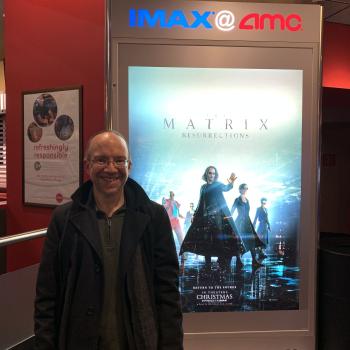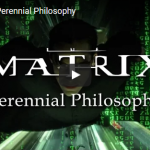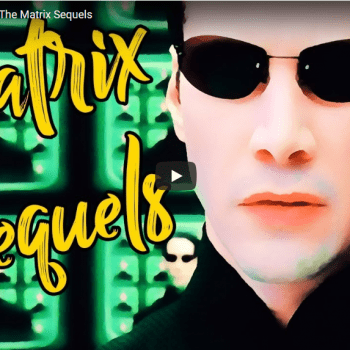Here is the YouTube video of my conversation with Tripp Fuller and Donna Bowman, two academics who were the absolutely ideal conversation partners for a discussion of the Matrix movies in general and the most recent one, The Matrix Resurrections, in particular. Have a listen!
Let me highlight some of the things that grabbed my attention in the most recent movie, and/or that I found worth revisiting in the original trilogy as a result of seeing this fourth one.
“Stories never really end”
Echoes of Total Rekall
The exploration of narration, history, truth, storytelling
Intersected with a recent article about stories creating empathy as well as reinforcing us vs. them binaries through the depictions of heroes and villains and the resolution of conflict between them.
“Why use old code to make something new?”
“The choice is an illusion”
So much about getting away from binaries
How do you know if you want something yourself or if your upbringing programmed you? (The same can be asked about biology, and both apply when “Tiffany” asks this question about motherhood).
Morpheus escapes the modal to enter the Matrix, which is not the top layer of reality. The latest movie brought the question of whether we can ever know we are in the “really real world” to the fore.
We tell stories that reflect our perception of reality. All our perception is a blurring of story and senses.
The Analyst speaks truth even if he does so in the interest of his own hegemony. Thomas Anderson converted elements of his life into narrative. Sublimation. Artists do this, but fantasy can become dangerous when we cannot distinguish it from reality.
Note that machines rescue Neo. This film more than any before it challenges the human-vs.-machine binary (although it had already emerged in the sequels).
Morpheus’ question: Are memories turned into fiction any less real?
“I don’t know. I don’t even know how to know.”
The Matrix turns the profound and inspiring into something trivial. Weaponizes our ideas and dreams.
About an hour in Neo wondered whether anything they did made a difference. I loved the way the film highlighted that it did make a difference, and what difference was made.
You changed what no one believed could be changed: the meaning of “our side”
Mnemosyne ship name, after the goddess of memory
War makes the same noise as the Matrix. “Takes over every damned thing.”
Zion was stuck in a Matrix of its own, believed it had to be us or them. This city was built by us and them.
Scarcity breeds violence
Smith: “What has the world come to when you can’t even trust a program?”
Sati: praying, “now all we need is a miracle”
Sheeple crave certainty
I love that there are “Neo-ologists”
Wachowski sisters’ trans experience (Lana & Lilly) connected directly with the story now that we understand them and what the films meant to them in a way most viewers did not when the original trilogy was released. In Resurrections we see what many observed about the original Matrix film, namely that characters and casting seem to be predominantly non-binary with respect to gender/appearance.
I was sorry we didn’t get to talk more about Thomas Anderson as suicide survivor and the ending with people/bots throwing themselves out windows as human missiles. Was this an attempt by the Analyst to trigger him?
In case you missed it, once again the last words from Lana Wachowski at the end of the credits are:
For mom and dad
Love is the Genesis of everything
On making money and intellectual property franchises (a major theme in the movie as well as in any discussion in the real world about the Matrix franchise): one can make a comparison with rebellious songwriters who make money challenging the system
There is an analogy to the One within the world of the films: the Matrix movies are an outlet we need that can stabilize or threaten the system
In response to a question about Io I suggest that goodness involves being committed to being permanently annoyed, living with imperfection.
Donna Bowman noted that Io resembles 1 and 0 (binary) as well as Zion with the end letters Z and N lopped off.
One thing that strikes me as problematic in the film is when Morpheus tells Neo, “If you want to see Trinity again you’re going to have to fight for her.” At that point they hadn’t really ascertained that she is alive.
Elsewhere on The Matrix Resurrections see Brian LePort’s post:
Ben Witherington also blogged about the movie:
Finally, if you haven’t already, see my post written right after seeing Resurrections for the first time here:













